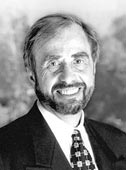The Bigelow Lecture
CEREBRAL COLLATERAL COMPLICATIONS ASSOCIATED WITH MYOCARDIAL REVASCULARIZATION
Dennis Mangano, a remarkably prolific and insightful critical care anaesthesiologist
earned his PhD in mathematics at MIT before entering medical school. His understanding
of complexity and extensive research on brain function after cardiopulmonary bypass
made him an ideal candidate for the Bigelow Lecture. He has long been a collaborator
with Richard Weisel, who introduced him to the audience. Dennis paid significant
and respectful homage to Bill Bigelow, reviewing his studies of hibernation, his
pursuit of hibernin and his significant contribution of the protective effects of
hypothermia during cardiopulmonary bypass. He then reviewed the prevalence of cerebrovascular
disease in patients over 65 -- 36% in those who undergo cardiovascular surgery.
The cost of postoperative central nervous system complications is staggering --
1.4 billion dollars per year.
Dennis has led a remarkable number of clinical trials through his network of cardiac
colleagues throughout the world. He is the founding President of the Ischemia Research
and Education Foundation. He reviewed the precipitating factors in central nervous
system complications, demonstrating embolic ischemic changes in the retina and PET
scans of the brain, showed us the vascular problems in the aorta and carotid arteries
which should be scanned or evaluated prior to cardiopulmonary bypass. During perfusion,
hypotension is a common complication based on worldwide studies conducted with his
colleagues. The stroke rate is clearly reduced in patients who are maintained with
higher mean blood pressure. Macroembolic injury occurs from disturbance of aortic
plaques. Microemboli cause small capillary arterial dilations (SCAD). Hyperglycemia
during bypass increases progression of ischemic injury and progression to hemorrhage.
For each 0.5 degrees centigrade the stroke severity doubled. There is an inflammatory
cellular response to bypass via selectins adhesion molecules and inflammatory cytocines.
In general there is an incidence of approximately 3.2% of clear cut strokes and
an additional 3% who develop encephalopathy with transient global dysfunction. Cognitive
dysfunction persists long-term in patients after cardiopulmonary bypass in 5%. Treatment
options include retrograde cerebral perfusion, avoidance of aortic and carotid pathology
through preoperative or precannulation imaging, intra-aortic filters, temperature
management and various pharmacologic interventions. Prominent among these is the
use of barbiturates and insulin (1), anti-inflammatories such as steroids, nsaids
and protease inhibitors.
|

Dennis Mangano
|
Adenosine augmentation is a special interest of Dennis Mangano's. There's clear
evidence that adenosine increases in coronary venous blood in response to injury.
Augmentation of the protective effects of adenosine decreases mortality, heart failure
and stroke. Some novel approaches to the problem of central nervous system injury
include the omission of anaesthesia (not a good idea) and exploration of the technology
of off-pump cardiac surgery. There are fewer microemboli by doppler and meta-analyses
of series of off-pump cases shows a decreased incidence of stroke with omission
of the cardiopulmonary bypass. The vascular blood pressure temperature factors still
influence postoperative cognitive outcomes. Antithrombotics such as tissue plasminogen
activator and heparin have hemorrhagic side effects which limit their usefulness.
Recent use of low molecular weight heparin has proven to be helpful in stroke patients.
Dennis left us with the message that the activated platelet which causes microvascular
plugging should be a target of therapy. Remarkably low doses of aspirin inactive
platelet cyclo-oxygenase and early administration of aspirin in the postoperative
period has been proven to decrease strokes, encephalopathy and cerebral death. He
concluded by saying we have now better insight into cognitive dysfunction and a
very good understanding of what to avoid. The brain suffers from many of the drugs
that we have tried, but hypothermia and aspirin work -- the best solution. The rest
of the solution still evades us.
In closing, Dennis returned to Bigelow's legacy, having ably illustrated and exemplified Bigelow's wide ranging scientific curiosity and intellectual humility.
M.M.
(1) Rao V, et al. The Insulin Cardioplegia Trial: Myocardial protection for urgent
coronary artery bypass grafting. J Thorac Cardiovasc Surg. 2002;123:928-35.
|